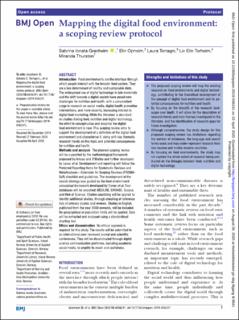| dc.description.abstract | Introduction Food environments are the interface through which people interact with the broader food system. They are a key determinant of healthy and sustainable diets. The widespread use of digital technology in late modernity and the shift towards a digital society have posed new challenges for nutrition and health, with a concomitant surge in research on social media, digital health promotion interventions, and more recently, increasing interest in digital food marketing. While the literature is abundant on studies linking food, nutrition and digital technology, the effort to conceptualise and describe the digital food environment is new. This scoping review aims to support the development of a definition of the digital food environment and characterise it, along with key thematic research trends on this topic and potential consequences for nutrition and health. Methods and analysis The planned scoping review will be supported by the methodological framework proposed by Arksey and O’Malley and further developed by Levac et al. Development and reporting will follow the Preferred Reporting Items for Systematic Reviews and MetaAnalyses—Extension for Scoping Reviews (PRISMA-ScR) checklist and guidelines. The development of the search strategy was guided by the food environment conceptual framework developed by Turner et al. Four databases will be searched: MEDLINE, EMBASE, Scopus and Web of Science. Citation searching will be applied to identify additional studies, through checking of reference lists of primary studies and reviews. Studies in English, published from the year 2000 onwards, will be included. No geographical or population limits will be applied. Data will be extracted and analysed using a standardised charting tool. Ethics and dissemination No ethical approval is required for this study. The results will be submitted to an international peer-reviewed journal and scientific conferences. They will be disseminated through digital science communication platforms, including academic social media, to amplify its reach and usefulness. | |
